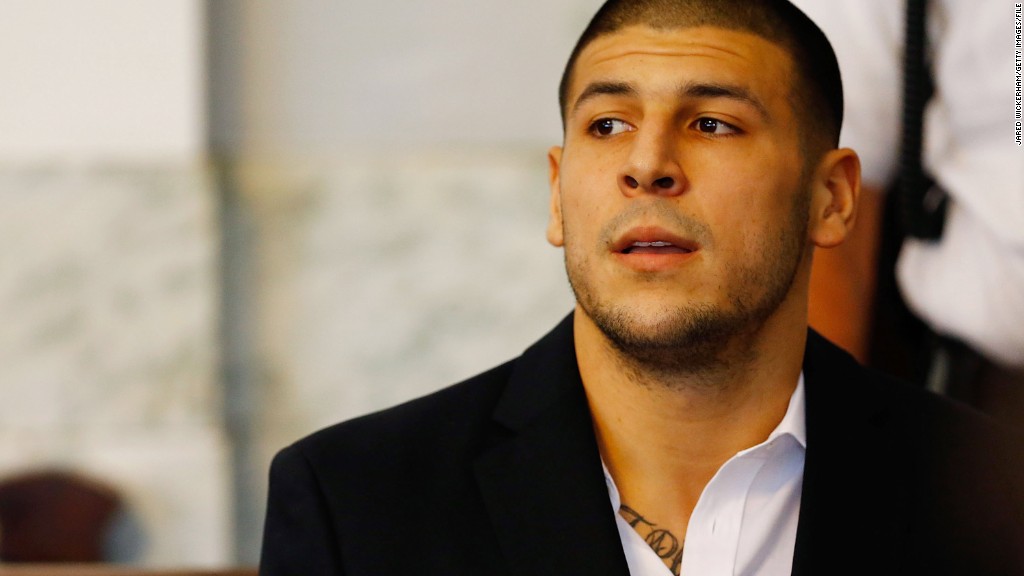While his former team celebrates yet another Super Bowl victory, ex-New England Patriots star Aaron Hernandez and his lawyers are instead gearing up for their next courtroom battle.
Hernandez is already serving a life sentence for a 2013 murder, and next month he will be tried in the 2012 killings of two men in Boston. Jury selection is expected to begin on Tuesday, February 14, with testimony scheduled to start on March 1.
Hernandez, 27, has pleaded not guilty to two charges of first-degree murder.
As Hernandez’s case gets underway, here’s what you need to know about his football career, his past conviction and what to expect at the trial.
From star athlete to convicted murderer
Once the pride of Bristol, Connecticut, Hernandez now spends his days in a maximum security prison 40 miles outside of Boston.
After leaving high school midway through his senior year, Hernandez played three seasons for the University of Florida before the Patriots selected him in the 2010 NFL Draft.
Playing tight end, Hernandez emerged as one of the Patriots’ bright young stars and parlayed his success into a $40 million contract extension, signed just weeks after the 2012 slayings in which he is accused.
The killing of Odin Lloyd
In April 2015, Hernandez was sentenced to life in prison without parole for the murder of his friend Odin Lloyd. Lloyd was a semi-professional football player, but his connection to Hernandez went beyond sports — Lloyd dated the sister of Hernandez’s fiancee.
During the trial, prosecutors said Hernandez orchestrated and tried to cover up the death of Lloyd, whose body was found in an industrial park just a mile from Hernandez’s home.
“They got it wrong,” Hernandez said as he was being transported from the courthouse to a state prison, according to a law enforcement source close to the case. “I didn’t do it.”
Hernandez has since appealed his conviction.
A piece of evidence during investigation
The men that Hernandez is accused of killing in 2012 — Daniel de Abreu and Safiro Furtado — did not know Lloyd, but the investigations into their deaths are connected.
While searching for evidence in Lloyd’s death, investigators discovered an SUV at Hernandez’s uncle’s house — the vehicle prosecutors say Hernandez was driving when he shot and killed de Abreu and Furtado.
Did a spilled drink lead to shootings?
Prosecutors say the victims were unknown to Hernandez and had no interaction with him before de Abreu accidentally bumped Hernandez near the dance floor at Boston’s Cure Lounge, spilling some of the football player’s drink.
This angered Hernandez, leading him to follow de Abreu, Furtado and three friends when they left the club in a car.
At a stoplight, Hernandez pulled alongside the victims’ car and opened fire, according to prosecutors.
What to expect at trial
Hernandez has enlisted Jose Baez, the lawyer who successfully defended Casey Anthony in her 2011 murder trial, as his defense attorney, and already Baez has scored some pretrial victories for the defense.
Baez successfully argued to ban prosecutors from mentioning Hernandez’s prior conviction. Also, testimony from the three survivors of the shooting who were in the car with de Abreu and Furtado will be limited, and they will not be allowed to identify Hernandez as the shooter.
However, the prosecution will be able to show jurors two of Hernandez’s tattoos featuring guns and shell casings, which they claim represent the two murders, and an admission of guilt.



